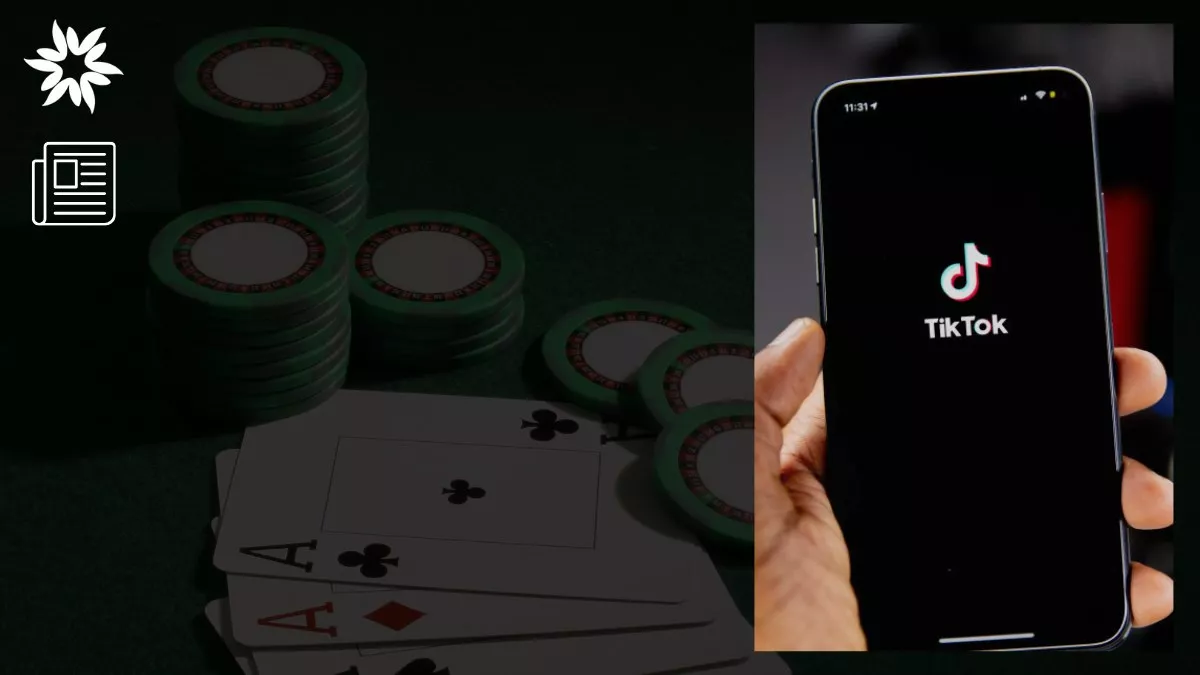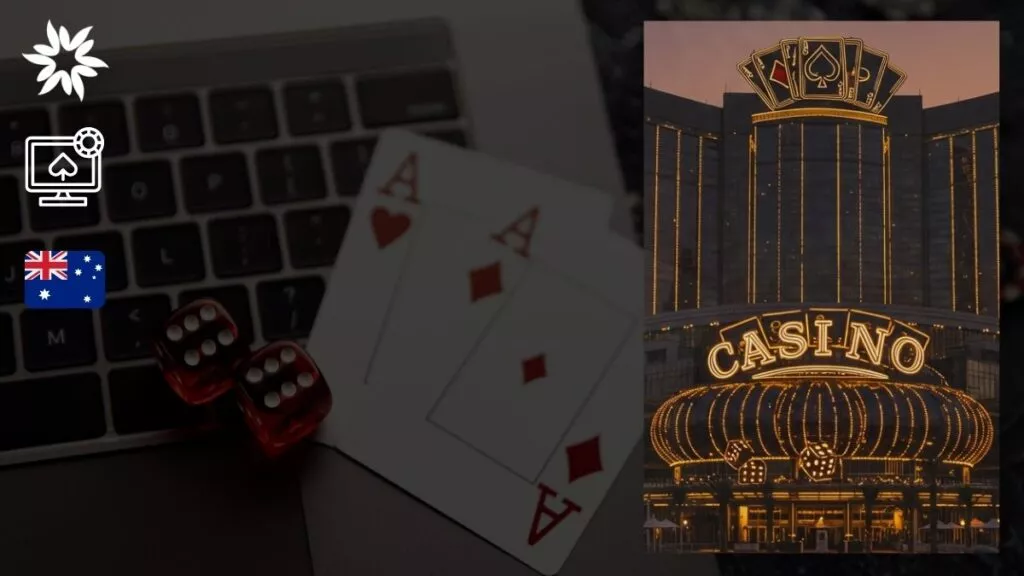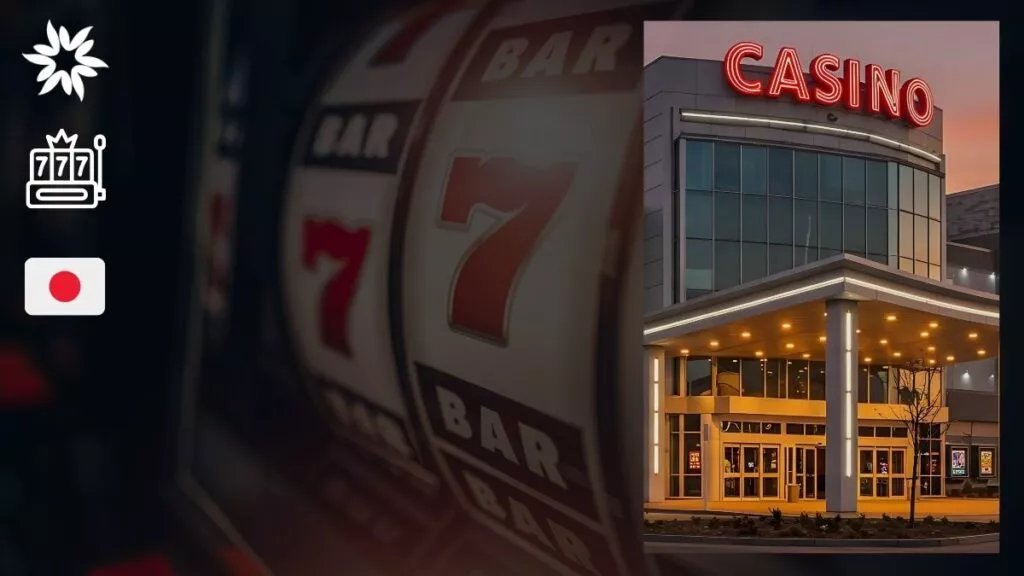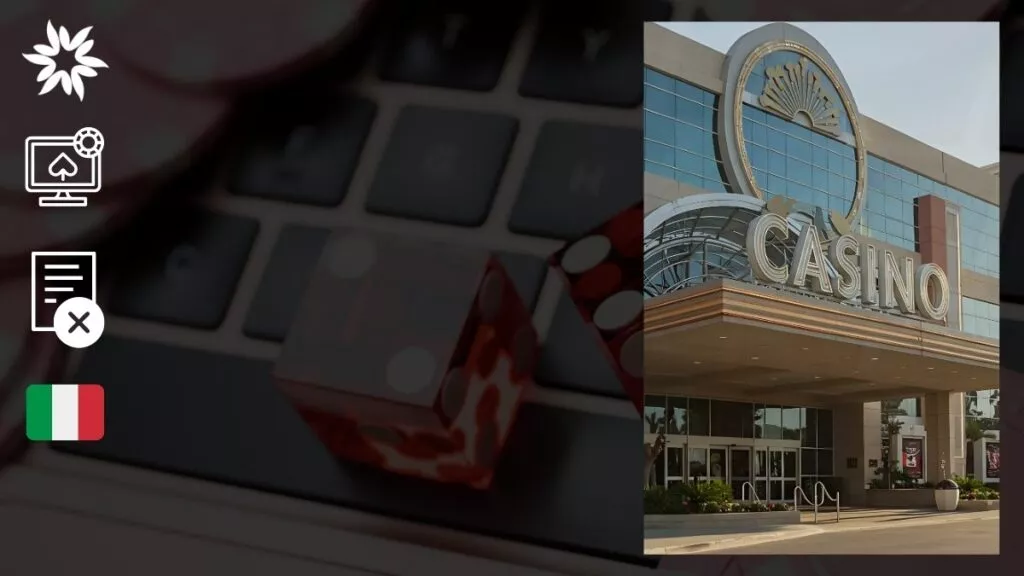Gambling companies are no longer shy about using different social media platforms like Facebook, Instagram, and Twitter to advertise real money gaming.
Moreover, the TikTok gambling trend is tapping into a broader and even younger demographic.
Its quick hits, constant feed, and illusion of winning via short-form videos are showcasing a whole new kind of casino.
In fact, it’s changing how people see risk and reward – and while many probably consider this harmless, there are also some who are saying that we might actually be witnessing a rise of a more concerning gambling culture.
Rise of Gambling Content on TikTok and Other Social Media
On platforms like Reddit, many have shared that they can’t seem to avoid gambling-related ads on platforms like TikTok.
Influencers such as Lady Luck HQ, with over 271,000 followers and nearly 4 million likes, showcase high-energy casino streams and jackpot reactions.
Similarly, accounts like NeverSplit10s, which focused on blackjack strategies, have over 154,000 followers. Other gambling-related TikTok accounts, like BCSlots, CowboySlots, and NGslot, have roughly 1 million followers combined.
Gambling content on social media is also prominent outside TikTok.
Lady Luck HQ also has a big following on Facebook. Instagram has influencers like Vegas Dave (@itsvegasdave), with 9.5 million followers, and D Lucky Experience (@dluckyexperience), who engages over 346,000 followers with luxury casino content.
All those numbers considered, the popularity of gambling content on TikTok and other social media platforms is simply undeniable.
Why Gambling Companies Work With Influencers
Studies on influencer marketing have shown that endorsements from credible figures can significantly impact consumer behavior, especially among younger audiences.
It’s been reported that Gen Z and millennials are more likely to trust influencers than traditional celebrities. This is why many gambling platforms today would rather tap influencers than celebrities to promote their brands.
Entain, one of the biggest sports betting and iGaming companies today, has spoken about why influencer marketing works.
They said that younger people are not really a consumer of traditional media, so it only makes sense for them to reach out through social media and influencers.
This perspective aligns with broader trends in influencer marketing, as highlighted by platforms like Afluencer and Famesters. They assert that influencers are particularly effective in reaching driving engagement, which is crucial for companies aiming to attract younger demographics.
There are several betting platforms that are known for collaborating with influencers to promote their services. Some of them are connected to influencers and even rappers like Drake.
Types of Viral Gambling Trends and Content on TikTok
So, what is it exactly that gambling influencers do that makes real money gaming a hit among TikTok users and even other social media platforms?
Well, it’s more than just sharing their gameplay.
Here are ways that gambling is promoted on TikTok and other social media platforms:
Big Win Reactions
These are videos of players hitting a big win or even a massive jackpot prize. They could promote the idea that if someone can do it, they can, too.
However, this can go downhill if the audience forgets about what it could take to hit a sizable win.
Strategy Tutorials
Some influencers share tips and tricks for games like poker, blackjack, and roulette. These tutorials can make gambling seem approachable, strategic, and even controllable.
Viewers, especially novices, may believe these claims because it’s typical for creators to use technical jargon and visual aids to appear authoritative.
Some would even promise guaranteed returns, and unfortunately, platforms like TikTok don’t heavily screen such content.
Gamified Challenges
An influencer can set up challenges like “bet $10 to win $100” or “double your money in 5 minutes.”
These quick, high-stakes bets are framed as harmless fun but can lead to impulsive gambling behaviors.
Live Stream Engagement
Real-time streams create a sense of community. Viewers watch as someone plays slots or other games. This shared experience makes gambling seem social and interactive.
The sense of community can also make people think that everyone is doing it, and so there’s fear of missing out (FOMO).
Influencer Collaborations
There are popular influencers who are known to partner with gambling brands or casinos.
Some might subtly or even loudly promote gambling through their content, especially in countries without strict marketing regulations in place for gambling activities.
Demographics of TikTok Gambling Content Viewers
TikTok’s audience skews younger, with 55% of users under 30 years old. The largest age groups are 18-24 years and 25-34 years, accounting for around 60% of TikTok users.
A large chunk of those age groups fall under children and young people (CYP), especially Gen Zs, who are still vulnerable to external influences from social media and digital platforms.
This vulnerability makes gambling and Gen Z an especially concerning combination.
Gambling advertisements and influencer promotions often normalize these activities, presenting them as fun or aspirational.
Also, CYP are more likely to experiment with gambling, especially now that gambling itself is becoming gamified through challenges, viral gambling trends, and flashy presentations. Some influencers simply blur the line between entertainment and risk-taking.
Does TikTok Allow Gambling Content Anyway?
TikTok’s policies on gambling content are strict but not absolute.
The platform prohibits the facilitation or marketing of gambling activities, including links to gambling services. Generally, content showing or glamorizing gambling is restricted to viewers aged 18 and older.
However, exceptions are made for paid advertisements that comply with age-targeting restrictions and local regulations.
The issue is that despite these measures, the prevalence of gambling-related videos suggests that enforcement may not be consistent. Therefore, TikTok’s approach to gambling content might need some revisions for clearer guidelines and stricter enforcement.
Understanding the TikTok Algorithm
TikTok’s algorithm is the unseen force behind the content users see.
This is what tracks your interactions on the app, including the videos you watch, the time you spend watching them, the posts you like, and even the content you scroll past. So, it’s a complex system designed to keep you interested in viewing more content.
In today’s lingo, this is what keeps you doom-scrolling.
TikTok’s “For You” Page
Unlike traditional social media feeds, which often prioritize chronological order, TikTok’s “For You” page is curated based on user behavior.
If you happen to interact with gambling-related content, TikTok’s algorithm takes note of it. Even if you watch a few seconds of a short gambling video, there’s a good chance that you’ll eventually find more gambling TikToks on your feed after a few scrolls.
Another thing worth noting is that TikTok’s algorithm heavily favors viral and trending content. Gambling influencers often leverage this by incorporating popular music, hashtags, and editing techniques to maximize their videos’ reach.
So, even if you have never searched for anything gambling-related using your TikTok account, you might still be a target audience just because you’ve been consuming content using viral music and hashtags that are also used on gambling videos. This creates a feedback loop that reinforces your preferences, even if those preferences weren’t intentional at first.
How Short-Form TikTok Casino Videos Drive Gambling Behavior
Now, it’s one thing to see gambling content, and it’s another to understand how it actually affects people. The way they’re presented on social media these days triggers certain psychological responses that make gambling more appealing.
Short-form videos, with their fast pace and engaging visuals, are designed to catch one’s attention and trigger cognitive reactions.
The Psychology of “Big Wins” and Instant Gratification
One of the most compelling aspects of gambling content on TikTok is the portrayal of big wins.
Studies consistently show that the anticipation and experience of reward, especially when unexpected, trigger the release of dopamine, a neurotransmitter associated with pleasure and motivation.
Even the anticipation of a potential reward activates the same brain regions as the reward itself. When viewers see someone else win big, their brains can simulate that experience. This is called a vicarious reward experience.
Another study focused on daily fantasy sports contests found that early big wins significantly increased participants’ engagement and financial investment in gambling. These wins create unrealistic expectations about future outcomes, and they motivate players to continue gambling.
This phenomenon, known as the “big win effect,” is a key driver of gambling behavior and is heavily exploited in TikTok videos.
The concept of instant gratification further amplifies the appeal of gambling content on social media. TikTok’s short-form format aligns perfectly with this psychological tendency as it offers quick and satisfying bursts of entertainment.
Why Visual and Auditory Stimuli Also Impact Gambling Perception
The sensory experience of gambling is another critical factor in making gambling-related content easier to digest or simply attractive.
If you look at gambling TikTok videos, they often feature lively visuals, flashing lights, and upbeat music.
Now, they’re not just for show because they’re actually carefully designed to make you feel excited about gambling.
A study published in Medical News Today explored how lights and sounds influence gambling behavior. The researchers found that the sensory stimuli associated with gambling, such as the flashing lights and celebratory sounds of slot machines, increased the likelihood of risky decision-making.
There was also a study at Southern Illinois University that examined the effects of auditory stimuli on gambling behavior. This involved asking participants to rate their perception of near-miss outcomes on a slot machine, with and without accompanying sounds.
The results showed that near-misses with auditory stimuli were perceived as closer to a win, even though they were losses. So, even if you’re watching someone almost hit the jackpot, you might still focus on possibly winning a casino game instead of also experiencing a near-miss.
The Role of Online Gambling Influencers and Social Proof
A recent study published in Springer, titled Current Addiction Reports, looked into the impact of influencer-driven gambling content on CYP. They found that influencers often use relatable strategies to normalize gambling.
Basically, they show gambling as a glamorous and accessible activity. Some promote links or their affiliate codes, while others do it without explicitly saying how a certain gambling site allowed them to enjoy the luxuries they now have.
Either way, this creates a sense of social pressure since viewers might feel compelled to emulate the influencer’s behavior.
Then, there’s also social proof. This is a powerful psychological phenomenon that influences human behavior. It happens when people see others engaging in an activity and feel like they should do the same, especially if they see those individuals as credible or relatable.
This combination of social pressure and social proof makes influencer-driven gambling content particularly impactful. It normalizes gambling behaviors and promotes an environment where followers are more likely to experiment with gambling themselves.
The Disconnect Between TikTok Wins and Real-World Losses
We’ve already established that TikTok’s curated gambling content can create a dangerous illusion.
This is made even worse since influencers typically only share favorable moments they experience when gambling – making it seem like playing is only about winning.
Distorted Perceptions of Probability
Gambling influencers make it seem like winning at casinos is as easy as 1,2,3.
They rarely share what it takes or how much they spend to get a significant win. This creates a false sense of probability.
This selective portrayal can lead viewers to believe that winning is not only common but also easily attainable, which is far from the truth. For example, slot machines are designed with a payout percentage that ensures the house always has an edge.
Yet, influencers might highlight moments of hitting jackpots without explaining the statistical improbability of such events. This creates a cognitive bias known as the “availability heuristic,” where people overestimate the likelihood of events based on how easily they can recall similar instances – in this case, the wins they’ve seen online.
Even near-misses or almost winning can have the same impact on viewers. They also trigger feelings of excitement and anticipation the way big wins do. So, even these could motivate viewers to gamble or continue playing until they actually hit a significant win.
Controversies Concerning Gambling Influencers
There was a time when gambling content was widely streamed on Twitch, a live-streaming platform primarily known for its focus on gaming content. However, in 2022, Twitch started to prohibit streaming unlicensed gambling sites that offer games like slots, roulette, and dice.
This decision was made to address concerns about scams, harm to viewers, and the lack of consumer protection on these sites. There has also been speculation on how some streamers are using fake games that entice their viewers to gamble on certain sites.
One of those streamers is xQc, who faced backlash for promoting crypto casinos.
While xQc admitted to gambling on stream, critics questioned whether his wins were genuine or influenced by sponsorship deals that provided him with unlimited chips to play with, or better yet, favorable odds in the games.
Similarly, Trainwreckstv and Roshtein are other well-known streamers who were accused of using sponsored accounts with altered odds to showcase massive wins.
Now, those allegations have never been proven, but it’s likely one of the reasons why platforms like Twitch have decided to impose stricter rules on showing gambling-related content.
Today, the mentioned streamers continue to post gambling-related videos.
Twitch also still allows gambling streams related to sports betting, fantasy sports, and poker, provided they comply with its guidelines that are similar to what TikTok has. It can be argued, however, that Twitch is stricter in terms of regulating gambling-related content.
Are there Credible Gambling Influencers?
Knowing those controversies, we can say that the credibility of gambling influencers can be a mixed bag. While some influencers may genuinely share their experiences, others operate in a gray area.
So what makes a gambling influencer credible? Here are some indicators:
Transparency
Credible influencers disclose their partnerships or sponsorships openly. They do this by stating it in the video upfront or in the captions of their posts.
Know that it’s illegal in countries like the United States, the United Kingdom, Canada, and Australia for content creators not to disclose sponsorships in their videos.
So, if you see content creators violating this, you can report them to governing bodies like the Federal Trade Commission (FTC) in the US.
Unfortunately, it’s the opposite for countries like Japan, Brazil, and China, as they lack guidelines for sponsored videos. The silver lining there is that if any local influencers in those countries actually disclose casino-sponsored posts, then you know they’re promoting gambling responsibly.
Showing the Balance Between Wins and Losses
Genuine gambling influencers share both their successes and failures to give a realistic view of gambling outcomes. So, if you see a TikTok account only talking about winning in casino games, treat it as an immediate red flag.
Their posts should also talk about the risks involved, such as the amount they spent before achieving a win. This is a great way to help viewers understand the unpredictable nature of gambling instead of glamorizing it as a series of endless wins.
Expertise
Expert content creators are usually the ones who don’t talk about winning. They’re usually those who also explain how a game works, the house edge, or your chances of winning (odds).
When it comes to getting tips and strategies, it’s wise to find content creators with a focus on specific casino games (slots, poker, or blackjack). They’re typically the ones with deeper insights to share.
However, practice responsible gambling even when consuming TikTok gambling content. Cross-reference the tips and strategies you get with other trusted sources (other videos, articles, etc.).
Educational Approach
Credible gambling influencers often educate their audience about responsible gambling practices. They might share tips for managing betting limits, discuss the dangers of gambling addiction, or provide resources for seeking help.
Engaging with their audience by answering questions honestly and addressing concerns builds trust. Influencers who actively communicate the complexities of gambling help viewers make informed decisions rather than blindly following trends.
Accountability and Community Feedback Integration
Speaking of engaging with their audience, truly credible influencers actively solicit and respond to feedback from their audience. They demonstrate a willingness to be held accountable for the information they share and the impact it has on their viewers.
This might involve admitting mistakes, correcting misinformation, or even taking down content that is deemed harmful. They create a space where open and honest dialogue is encouraged.
TikTok Gambling Videos: What Lies Ahead
We’ll definitely continue to see youth gambling TikTok trends, but we might also see more focus on the platform’s regulatory gaps.
Not so long ago, TikTok was under scrutiny after removing a video by Kate Susabu that criticised gambling advertisements. TikTok initially cited community guideline violations for the removal but later reinstated the video after public backlash.
Critics pointed out the irony of TikTok marketing itself as a platform for young people while still profiting from gambling-related content.
The question, however, is whether they will actually make a significant move to make their platform safer for younger audiences like Twitch.
We’ll have to wait and see.








